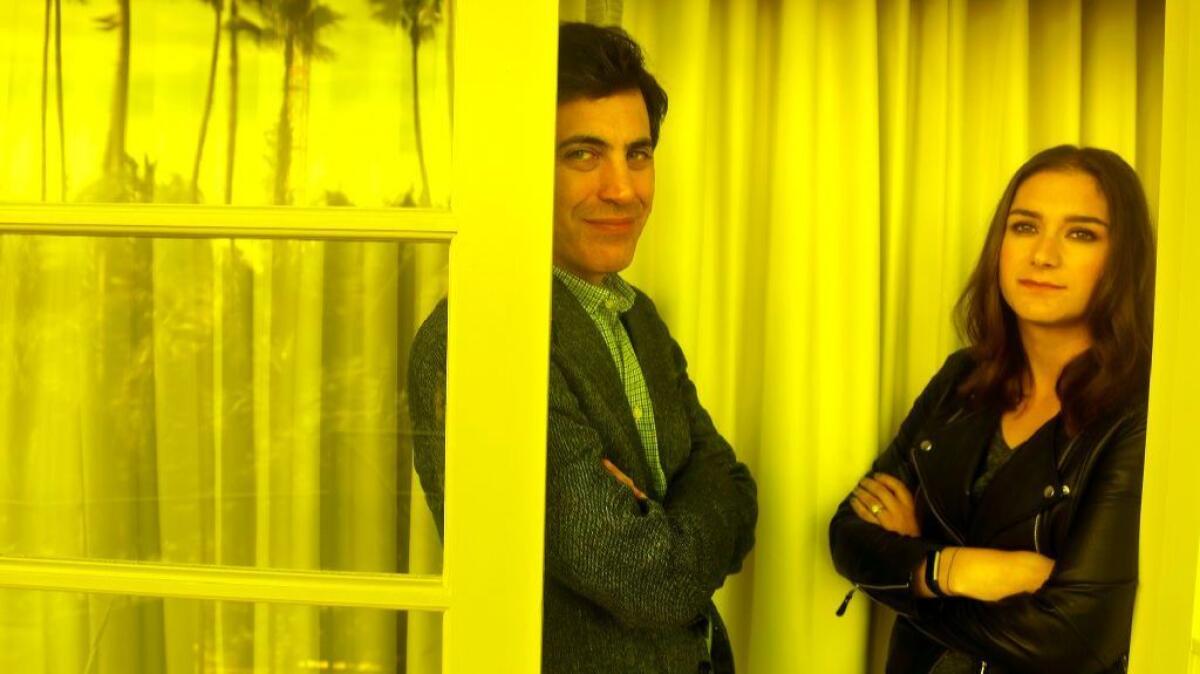In writing ‘The Post,’ self-doubt and insecurity align perfectly with the story that needed telling

- Share via
In the spring of 2016, I was struggling to make a career out of writing — I’d had a couple of tiny successes but nothing to significantly say, “Here I am.” I had just come off a job, one of those freelance writing gigs that we all take to get by, and was considering what to do next. And if that would even be writing. In the midst of this, my husband turned to me and said, “Why don’t you write that script about [Washington Post publisher] Katharine Graham?”
I had been wanting to tell Kay’s story for a while. I had read her memoir, “Personal History,” six years earlier and had been bowled over by this woman. Not only did she live an extraordinary life, but what gripped me was the way she spoke about it: vulnerable, unflinching, willing to admit mistakes and to delve into the potential choices she could’ve made. I knew I wanted to get her story into the world but I wasn’t entirely sure how.
The irony is that all the self-doubt and insecurity I felt were perfectly aligned with Kay’s own personality. Much like she would have, I compensated by reading and watching everything I could. Not just about her, but about editor Ben Bradlee, Eugene Meyer, Phil Graham and the Washington Post itself.
Sitting at my kitchen table over a year ago, there was no way to anticipate, or even dream, any of this could happen.
— Liz Hannah
Now it’s 2016, I’ve taken my husband’s advice and I have all of these notebooks in front of me, a dozen different lives that she’d led all pointing in different directions. Ultimately, I decided to tell the story that I related to the most: a woman finding her voice. This point in Kay’s life, after the death of her husband and her taking over as publisher, was arguably her most vulnerable.
She was a woman of an era when women weren’t supposed to have careers or opinions. And they definitely weren’t supposed to run Fortune 500 companies. She was the first woman ever to do so. But at the end of the day, the idea of a woman standing in a room of men, trying to get her voice heard — that felt like any number of rooms that I, and many other women I know, have been in.
What also made this particular moment in her life so impactful was that it involved the Post’s decision to publish the Pentagon Papers. The New York Times had initially published elements of the papers and the U.S. government had issued an injunction, something Kay and Bradlee knowingly went against with their decision to print. The true story of this event speaks to themes of journalistic integrity, and to the role of the Fourth Estate in the modern world.
The whirlwind journey of this movie began with that moment in the spring, continued in October when Amy Pascal called to tell me she’d bought it, and twisted upward again when Steven Spielberg, Tom Hanks and Meryl Streep all decided to make the film together. Together with this trio, Amy and Kristie Macosko Krieger championed this project every day and somehow had us in production in less than 12 weeks.
WATCH: Video Q&A’s from this season’s hottest contenders »
Soon after the Big Three signed up, Josh Singer came on board to co-write the film, to help push the boulder up the hill to our rapidly approaching production. Though trepidatious to jump back into the journalism well [after “Spotlight”], Josh instantly saw what I had seen years ago: the need to tell Kay’s story; the need to tell the story of the press. Josh was the perfect partner, with not only his talent, experience and undaunted work ethic, but also his continuous passion for these characters.
“Surreal” isn’t a word that even comes close. Being able to work hand in hand with these extraordinary filmmakers to tell the story of Katharine Graham was a dream I will not soon be able to replicate.
Sitting at my kitchen table over a year ago, there was no way to anticipate, or even dream, any of this could happen. Much like there was no way to imagine that a story that took place in1971 about both a woman struggling to find her voice and the brave journalists that stood up to the government might be at all relevant in 2017. And yet, it’s eerie how often the truth has felt under attack lately. Not just the truth of the press, but also the truth of women’s voices.
More and more we have had to witness women’s voices being questioned and dismissed. It’s been 46 years since the events of this film and in many ways, the world hasn’t changed that much. But maybe that’s why we look back at history. Not only to learn, not only to tell the stories that haven’t been told, but to remind ourselves: History is cyclical. We’ve been in dark places before and, eventually, the truth always has a way of shining through.
More to Read
From the Oscars to the Emmys.
Get the Envelope newsletter for exclusive awards season coverage, behind-the-scenes stories from the Envelope podcast and columnist Glenn Whipp’s must-read analysis.
You may occasionally receive promotional content from the Los Angeles Times.







